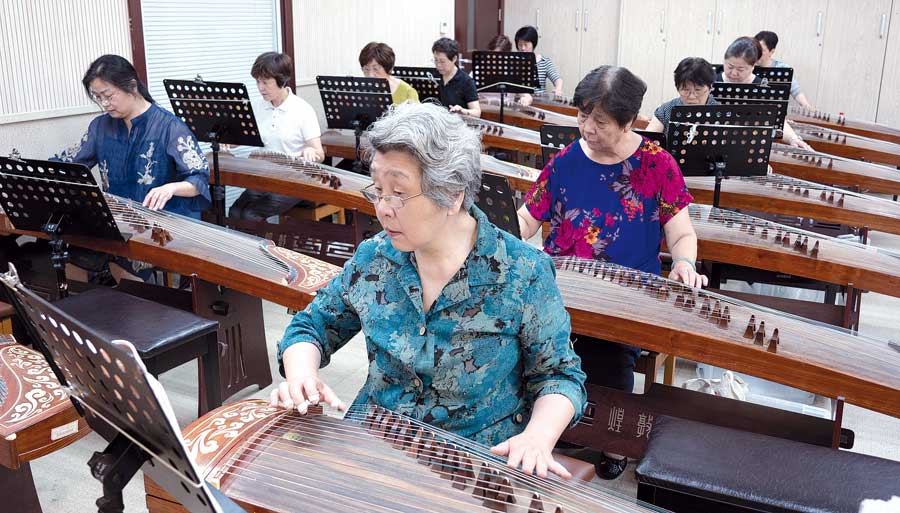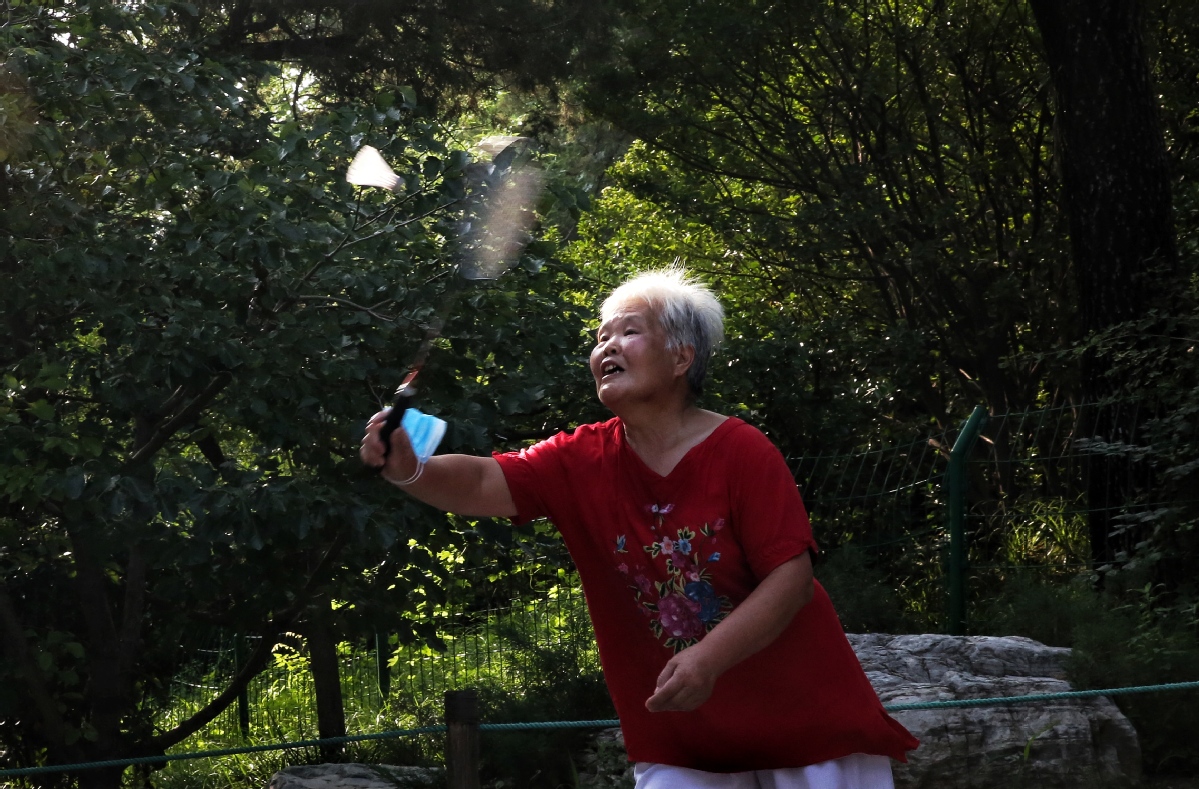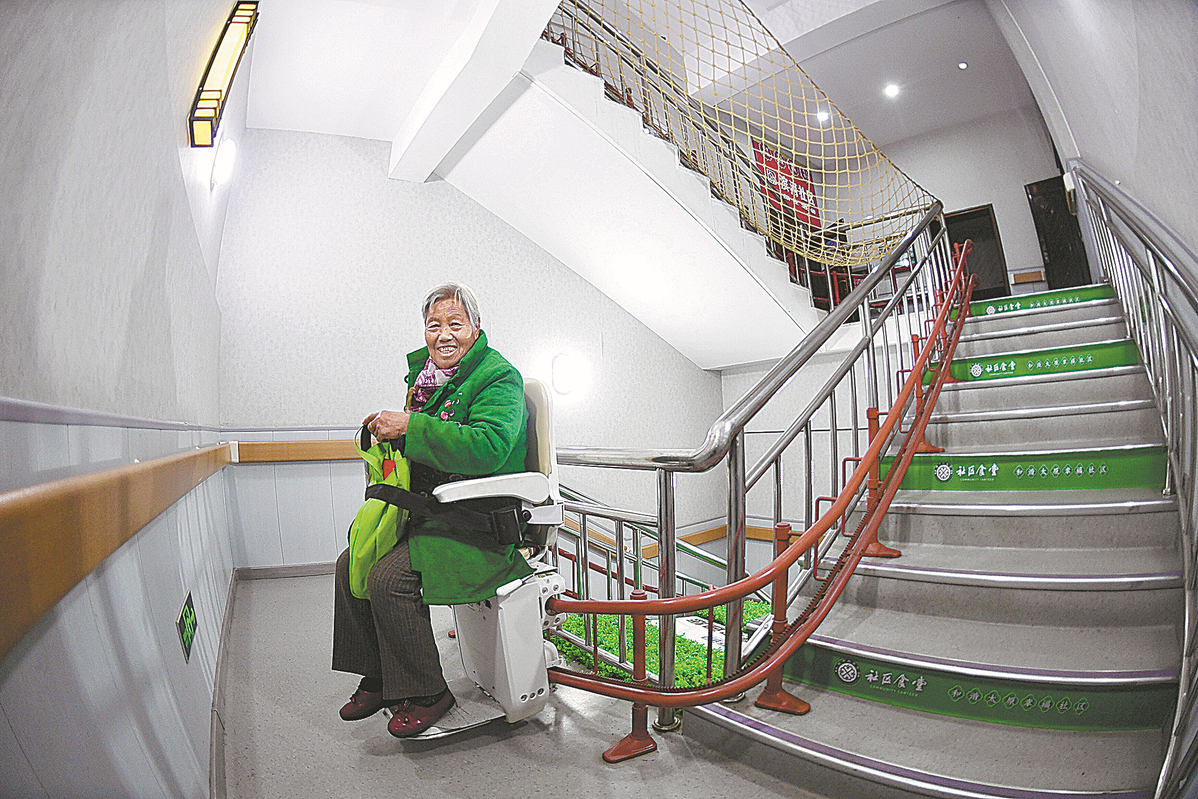[ad_1]
(China Daily) 11:06, February 24, 2023

Students learn to play traditional Chinese musical instruments at a school for the elderly on Nantangbang Road in Shanghai. PHOTO BY GAO ERQIANG / CHINA DAILY
Increased attention paid to healthcare for the elderly
Beijing native Jia Jun, 61, grew up in a house in a hutong, or alleyway, near Hufang Bridge in Xicheng district, where her mother has lived for more than 80 years.
In 1997, her mother, who was then 68, suddenly started vomiting and then fainted. A neighbor drove her to a hospital emergency center. After an examination, she was diagnosed with cerebral hemorrhage, which left her in a coma for four days.
Several years later, Jia’s mother had a stroke at home. Jia, who was there at the time, pushed her to the hospital in a wheelchair.
“My mother is now 93. In the past 20 years, she has been hospitalized four times because of different medical problems,” Jia said.
“I had been taking her to see a doctor regularly, but when she was in her 80s, she was diagnosed with chronic obstructive pulmonary disease. Since then, I have been afraid to take her to the hospital when it’s extremely hot or cold in Beijing in case her condition worsens.”
Jia, who retired as a factory worker when she was 41 to take care of her mother, found a job in a restaurant five minutes from home. “Now, if my mom phones me, I can pop home quickly to see her,” she said.
Four years ago, after being diagnosed with diabetes, her mother was prescribed drugs to treat hypoglycemia. She now has at least five chronic diseases and takes a dozen pills after each meal.
Meanwhile, in early March, Jia’s father-in-law, who is 90 and has dementia, had a fall during the night. Since then, Jia and her husband have been afraid to let him live on his own, and she now regularly attends to him.
Jia said, “If I want to take good care of my mother and my father-in-law, I need to do more than just earn money, but if I can’t make money, what will happen to them?”
Figures released by the National Bureau of Statistics on Jan 17 show there were more than 280 million people age 60 or older in China by the end of last year, accounting for 19.8 percent of the population. According to the UN, a country is defined as “aging” when more than 10 percent of its population is age 60 or older, and “aged” when the proportion is 20 percent or higher.
Liu Xiaohong, chief physician in the geriatrics department at Peking Union Medical College Hospital, said 50 percent of people who are 65 or older in China have at least three chronic conditions. Liu has been engaged in geriatrics studies for more than 20 years.
Figures from the National Health Commission, or NHC, show that more than 78 percent of seniors who are 60 or older have at least one chronic disease.
Although the illnesses Jia’s mother and father-in-law have contracted are chronic, they are not immediately life-threatening. However, the psychological impact of long-term care for the older generation, and the changes Jia has faced in her life and work, highlight the need to rethink care for the elderly.
Aging and death are both inevitable, but improvements can be made to seniors’ self-sufficiency to a certain degree.
In China, medical insurance for acute care used to be specialized, categorized by organs, and was not specifically for the elderly.
As a result, hospitals needed to develop a seniors-friendly environment to conduct a comprehensive geriatric assessment of such patients, manage them through an interdisciplinary team, and solve reversible problems in aging to allow seniors to take care of themselves and return home.
According to the NHC, by the end of 2021, China had set up six national clinical research centers for diseases among geriatrics, and medicine departments for geriatrics had been established in more than 4,600 public hospitals at secondary level or higher.
Dignified life
Peking Union Medical College Hospital’s department of geriatrics, established in 2006 by Liu, the chief physician, is one of the first of its kind in China.
“As chronic diseases have become the main cause of death and disability among the elderly, and about 80 percent of seniors die from such diseases, the focus of elderly care is on preventing disease, organ failure, function decline and other adverse events,” Liu said.
“If seniors are partially disabled, we help them function as much as possible, but if they are completely disabled, we need to help them live a dignified life in their last days.”
The approach adopted by doctors seeing geriatric patients is different from that of specialized diagnosis and treatment departments in hospitals, which center on seniors’ daily living activities.
“We need to accurately care for the elderly who have several chronic conditions to check whether they have taken inappropriate medication, or if they have any illnesses occurring at the same time,” Liu said.
“In geriatrics, we do this through medication. If the person is sick and his or her diseases are co-occurring, their treatment will be aimed at reducing lipids (organic compounds that are insoluble in water), hypertension and platelets (tiny blood cells). It’s the same for every patient,” she said.
In cases where multiple chronic conditions coexist, it may not be good for elderly patients to take medication prescribed by doctors in various fields.
Liu said: “We first ask patients about all the medication they are taking. We then spend a lot of time trying to see which drugs are not working, whether there are overlapping medication errors, and if any of the drugs are putting the patient at risk.
“For example, our department has stopped prescribing enteric aspirin for primary prevention of cardiovascular diseases, which is used in specialist clinics, because of the risk it poses to older adults.”
Such medication is designed to withstand stomach acid and pass through the stomach before fully dissolving in the small intestine.
Teamwork is particularly important, with pharmacists, psychologists, rehabilitation therapists, nurses and doctors playing key roles in geriatrics departments’ daily work.
Comprehensive geriatric assessment — a multidisciplinary diagnostic and treatment process that involves all staff members in the department — identifies seniors’ medical, psychosocial and functional capabilities, enabling a coordinated plan to be drawn up for each patient’s needs.
Liu said, “These procedures are aimed at treating a particular disease, but as chronic illnesses are incurable, we shift our focus to maintaining functions among the elderly.”

An elderly woman plays badminton at Jingshan Park in Beijing on July 20, 2020. [Photo by Jiang Dong/chinadaily.com.cn]
Life expectancy rises
Liu believes it is necessary to give the healthy “young old” (those in the 65 to 74 age group) more work opportunities and social support to cultivate a positive mindset and embrace the arrival of an aging society.
“In view of China’s huge population, the official retirement age was set at 60. But average life expectancy in the nation has reached 78.2 years, and in many developed countries a retirement age of 65 is preferred,” Liu said.
“In active aging, those in the ‘young old’ age group receive pensions and see themselves as contributing to society. As a result, their social psychology is healthy and they have a sense of happiness, which is the modern health concept of contributing both to society and their neighbors.”
In March, a research report by the McKinsey Health Institute showed that average global life expectancy rose from 30 to 73 years from 1800 to 2017. But the proportion of those in poor health has not diminished over time. On average, 50 percent of people are in less-than-good health, including 12 percent in poor health.
The report said that if people improve their environment, change their lifestyle and take good care of their health, they can achieve about six years of healthy aging.
Liu agrees with the notion, and said nursing, medical treatment, and social and environmental support are areas in which healthy aging can be attained.
Improving the health of its aging population is part of China’s long-term plan to promote care for seniors.
“It doesn’t make much sense to the elderly if we only focus on the diseases they’ve got.
“The goal is to maintain and perform the function of the elderly, improve their quality of life, and make their families happy. We’re improving seniors’ healthy life expectancy, which means giving them more time to live on their own,” she said.

A woman takes a ride on a stairlift chair at the Binhe elderly care center in the city of Taiyuan. Thanks to this device, residents are free to come and go as they please. [Photo by MI GUOWEI/FOR CHINA DAILY]
Maintaining function
The progression of some seniors’ medical conditions, such as incapacity or dementia, can be delayed if scientific ideas and methods are adopted and they are also shown sufficient patience and perseverance.
Bao Changxiao, 50, a caregiver at a nursing home in Beijing, has looked after the elderly who are incapacitated, including those with senile dementia, for 24 years.
“The rate at which a chronic illness progresses in a senior patient can be slowed if the right approach is taken to their care, unlike a patient of about the same age and with the same symptoms who has not received any care,” she said.
Bao added that an elderly man she helped after he had a stroke had been barely able to get out of bed, but after rehabilitation training, he can now walk with the aid of a stick.
“It is quite a tough task for him. Because of the stroke, he is reluctant to move, but he needs exercise, so we caregivers speak gently to encourage him to walk every day,” Bao said.
Long-term care for the elderly requires experience, which is a combination of care, patience and love.
In addition to physical aging and pain, the elderly may experience psychological problems, which can be stressful for long-term caregivers.
“About 40 percent of the elderly I work with have problems such as apathy, a lack of communication, depression, anxiety and irritability. Their families may initially be devoted to their care, but over time people become tired of this work, and they also have their own pressures from work and life,” Bao said.
She has also arranged for social workers to visit the elderly to listen to their concerns.
“Resistance training can only work on the elderly if they cooperate and make efforts to receive it,” she said. Such training is a form of exercise essential for health and fitness.
Bao, who mainly serves the elderly in Beijing’s Fengtai district, said residents in the area are increasingly beginning to think about how they and their loved ones deal with death.
“They put forward ideas concerning their relatives’ deaths. Instead of being sent to the emergency room at a hospital, the elderly prefer to make their own decisions so that their families suffer less,” she said.
Liu, from Peking Union Medical College Hospital, said, “Medicine for geriatrics is inseparable from palliative care.
“We propose integrated care to help the elderly take care of themselves as much as possible so that they can enjoy life.
“In addition, every person has the right to know about his or her illness and make decisions individually. We hope the older adults can live well and die well.”
(Web editor: Wu Chaolan, Liang Jun)
[ad_2]
Source link



